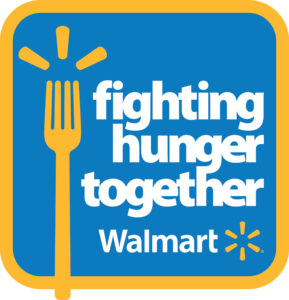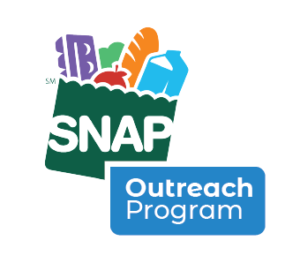
SNAP Outreach
The Supplemental Nutrition Assistance Program (SNAP) is a program administered by the United States Department of Agriculture that offers nutrition assistance to lower-income individuals and families.
The goal of the program is to help people have access to nutritious food while helping them stretch their budget. SNAP applications are processed through the Department of Health and Human Resources. SNAP benefits are issued monthly to an Electronic Benefits Transfer (EBT) card that works just like a debit card. EBT cards can be used to buy groceries through various types of vendors including grocery stores, convenience stores and farmers’ markets.
For a free, confidential eligibility screening, call 1.844.292.3217
SNAP Frequently Asked Questions
General Questions
- Foods for human consumption
- Seeds and plants that produce food for consumption by SNAP households.
Any non-food items such as;
- pet foods,
- soaps,
- paper products,
- household supplies,
- grooming items,
- cosmetics,
- alcoholic beverages
- tobacco,
- vitamins and minerals,
- any food that will be eaten in the store,
- hot foods that are ready to eat, or
- any food marketed to be heated in the store.
- All eligible individuals who live together and who purchase and prepare meals together more than 50% of the time must be included in the same SNAP benefits.
- Married couples living together,
- children under age 22 living with a parent, and
- two people (married or unmarried) living with a common child are all required to be included in the same SNAP benefits.
It can take up to thirty days for your application to be processed completely.
No. Your benefits will carry over from month to month, and are good for up to 365 days.
The amount of your SNAP benefit is determined by your household’s gross income and the number of people living in your home. Deductions from your income are also taken into account.
The allowable deductions are:
- a standard deduction for utility costs if you pay for your primary heat source;
shelter costs; - a deduction for dependent care costs when necessary for work, training, or education;
- a deduction for legally owed child support payments; and
- a deduction for medical costs for elderly and disabled people.
All changes in income should be reported to the DHHR. If an increase in your household’s income puts you over the gross monthly income limit for SNAP, the change must be reported no later than the 10th day of the month following the change.
Questions from Students
For SNAP purposes a college student is defined as an able-bodied person aged 18 to 49 who is enrolled at least half time (taking 6 or more credit hours in one semester).
A student enrolled at least half time who does not meet any of the exemption criteria is an ineligible student. Additionally, any student who lives in a dormitory operated by the school and receives the majority of his or her meals from the school is also an ineligible student for SNAP.
No. Only students enrolled more than half time are required to meet an exemption to receive SNAP.
A student who meets all of the other SNAP eligibility requirements will be able to receive SNAP if he or she meets any of the following:
- Work at least 20 hours a week (this must be paid employment);
- Get public assistance benefits under a Title IV-A program of the Social Security Act;
- Take part in a State or federally financed work study program;
- Are taking care of a dependent household member under the age of 6;
- Are taking care of a dependent household member over the age of 5 but under 12 and do not have adequate child care to enable them to attend school and work a minimum of 20 hours, or to take part in a State or federally financed work study program; or
- Are assigned to or placed in a college or certain other schools through:
- A program under the Workforce Investment Act of 1998,
- A program under Section 236 of the Trade Act of 1974,
- An employment and training program under the Food Stamp Act, or
- An employment and training program operated by a State or local government.
- Also, a single parent enrolled full time in college and taking care of a dependent household member under the age of 12 can get SNAP benefits if otherwise eligible.
No. Even if you are not taking summer classes, you are still considered a student if you will be enrolled at least half time in the upcoming semester.
Questions from Seniors 60+ or from Individuals with Disabilities
A person is considered elderly by the DHHR if they are 60 years of age or older.
No. Anyone who is eligible to receive SNAP can get the benefit.
For elderly members and disabled members, allowable medical costs that are more than $35 a month may be deducted unless an insurance company or someone who is not a household member pays for them. Only the amount over $35 each month may be deducted.
Allowable costs include:
- most medical and dental expenses, such as
- doctor bills,
- prescription drugs
- dentures,
- inpatient and outpatient hospital expenses,
- nursing care.
- they also include other medically related expenses, such as
- certain transportation costs,
- attendant care, and
- health insurance premiums.
Proof of medical expenses and insurance payments is required before a deduction for these expenses may be allowed.
No. The costs of special diets are not allowable medical costs.
Yes.
- The Special Reduced Residential Service Rate Program (20% Utility Discount Program). Eligible participants age 60 and older may receive a 20% discount from their electric and/or gas company. The electric and/or gas company will be responsible for determining your eligibility for the Special Reduced Residential Service Rate.
- Low Income Home Energy Assistance Program (LIHEAP). LIHEAP assists eligible households with the cost of home heating through direct payments to utility companies on their behalf.
- The Special Supplemental Nutrition Program for Women, Infants, and Children (WIC). This program provides supplemental foods, health care referrals, and nutrition education for low-income pregnant, breastfeeding, and non-breastfeeding postpartum women, and to infants and children up to age five.
Yes. Not receiving the minimum benefit amount is the same as throwing away a BIG coupon worth $16 per month. That is a yearly loss of $192.
Yes. You can appoint a person whom you trust to be an Authorized Representative for your case. This person will have access to your information and will be able to act on your behalf. Most DHHR offices require a signed statement from you in order to appoint an Authorized Representative.
Able-Bodied Adults Without Dependents FAQ
In West Virginia, able-bodied SNAP recipients age 18 to 49, without children and who live in certain counties, will need to meet a 20 hour work requirement unless they meet one of the exemptions.
Nine counties throughout the state are currently implementing the ABAWD requirements: Berkeley, Cabell, Harrison, Jefferson, Kanawha, Marion, Monongalia, Morgan, and Putnam Counties.
In order to receive SNAP, you will be required to consistently participate in a work or educational activity for a monthly average of 20 hours per week or meet one of the exemptions. One way to fulfill this work requirement is to participate in a SNAP Employment and Training (E&T) Program. You will only be able to receive SNAP for three months every three years if you do not meet the requirements or an exemption.
If you meet an exemption, and live in one of the 9 counties affected, please contact WV DHHR Client Services at 1-800-642-8589, or your DHHR case worker to report your exemption.
Some of the exemptions include:
- Being under the age of 18 or over the age of 49.
- Being medically certified as unable to work.
- Receiving unemployment compensation.
- Receiving SSI.
- Working an average of 20 hours per week.
- Being a pregnant woman.
- Participating regularly in a drug or alcohol rehabilitation program.
- Child under the age of 18 in the household.
- Caring for an incapacitated person.
Your local DHHR office will refer you to the Employment & Training Program (E&T Program) in your area. This program is designed to offer ABAWDs educational activities, prepare them for employment, and to help them get a job.
After three months, you will lose your SNAP benefits. You may be eligible to receive SNAP again if you meet the work requirements in the future.
How to Get Help
CALL
Call Toll Free 1 (844) 292-3217
LEARN
With one confidential phone call, an outreach specialist can help you find out if you may be eligible to receive SNAP benefits.
FOLLOW UP
We will stay in touch with you throughout the SNAP application process.
 This program is brought to you in part through the generous support of the USDA and the WalMart Foundation.
This program is brought to you in part through the generous support of the USDA and the WalMart Foundation.
Catholic Charities West Virginia is an equal opportunity employer and service provider.
Catholic Charities West Virginia is open to all people regardless of their race, color, national origin, gender, religion, age, disability, protected veteran status, political beliefs, sexual orientation, socio-economic background, marital or family status.

